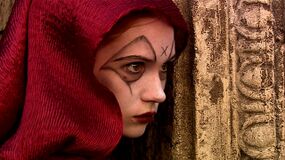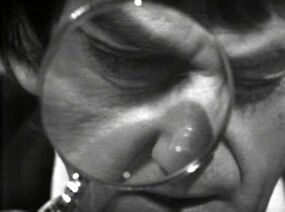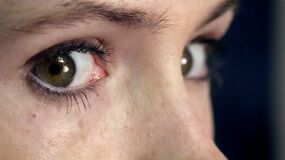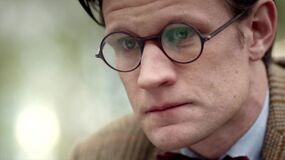Vision: Difference between revisions
m (Linking to the Doctor's sonic screwdriver) |
No edit summary |
||
| Line 5: | Line 5: | ||
[[Eidetic memory]], or photographic memory, was the ability to recall what one had seen before. ([[TV]]: ''[[Invasion of the Bane (TV story)|Invasion of the Bane]]'', ''[[The Wheel in Space (TV story)|The Wheel in Space]]'', ''[[Terror of the Vervoids (TV story)|Terror of the Vervoids]]'', ''[[The Eleventh Hour (TV story)|The Eleventh Hour]]'') Some people, with a [[night vision]] ability, could see well in the [[darkness|dark]]. ([[PROSE]]: ''[[Halflife (novel)|Halflife]]'', ''[[Tragedy Day (novel)|Tragedy Day]]'') | [[Eidetic memory]], or photographic memory, was the ability to recall what one had seen before. ([[TV]]: ''[[Invasion of the Bane (TV story)|Invasion of the Bane]]'', ''[[The Wheel in Space (TV story)|The Wheel in Space]]'', ''[[Terror of the Vervoids (TV story)|Terror of the Vervoids]]'', ''[[The Eleventh Hour (TV story)|The Eleventh Hour]]'') Some people, with a [[night vision]] ability, could see well in the [[darkness|dark]]. ([[PROSE]]: ''[[Halflife (novel)|Halflife]]'', ''[[Tragedy Day (novel)|Tragedy Day]]'') | ||
The [[Eighth Doctor]] claimed to have excellent night vision, ([[PROSE]]: ''[[Legacy of the Daleks (novel)|Legacy of the Daleks]]'') as did the [[Fifth Doctor]]. ([[PROSE]]: ''[[Observation (short story)|Observation]]'') Indeed, [[Gallifreyan physiology|Gallifreyan]] eyes were better at seeing in the dark, and could gather and enhance available light, ([[PROSE]]: ''[[Lucifer Rising]]'') with incredible detail from a far distance, ([[TV]]: ''[[The Eleventh Hour (TV story)|The Eleventh Hour]]'', ''[[The Hungry Earth (TV story)|The Hungry Earth]]'') and with a great amount of control. ([[PROSE]]: ''[[Seeing I (novel)|Seeing I]]'') | The [[Eighth Doctor]] claimed to have excellent night vision, ([[PROSE]]: ''[[Legacy of the Daleks (novel)|Legacy of the Daleks]]'') as did the [[Fifth Doctor]]. ([[PROSE]]: ''[[Observation (short story)|Observation]]'') Indeed, [[Gallifreyan physiology|Gallifreyan]] eyes were better at seeing in the dark, and could gather and enhance available light, ([[PROSE]]: ''[[Lucifer Rising (novel)|Lucifer Rising]]'') with incredible detail from a far distance, ([[TV]]: ''[[The Eleventh Hour (TV story)|The Eleventh Hour]]'', ''[[The Hungry Earth (TV story)|The Hungry Earth]]'') and with a great amount of control. ([[PROSE]]: ''[[Seeing I (novel)|Seeing I]]'') | ||
The [[Fourth Doctor]] indicated that he was [[myopia|short-sighted]] in his right [[eye]], and so sometimes required an [[eyeglass]]. ([[TV]]: ''[[Four to Doomsday (TV story)|Four to Doomsday]]'') The [[Ninth Doctor]], finding himself squinting to see the TARDIS monitor, discovered that he was made short-sighted as a result of an energy drain via [[Glubby Glub]], and pondered if he needed glasses. ([[AUDIO]]: ''[[Retail Therapy (audio story)|Retail Therapy]]'') | The [[Fourth Doctor]] indicated that he was [[myopia|short-sighted]] in his right [[eye]], and so sometimes required an [[eyeglass]]. ([[TV]]: ''[[Four to Doomsday (TV story)|Four to Doomsday]]'') The [[Ninth Doctor]], finding himself squinting to see the TARDIS monitor, discovered that he was made short-sighted as a result of an energy drain via [[Glubby Glub]], and pondered if he needed glasses. ([[AUDIO]]: ''[[Retail Therapy (audio story)|Retail Therapy]]'') | ||
| Line 15: | Line 15: | ||
[[Sarah Jane Smith]] believed that [[dog]]s could only see in [[monochrome|black and white]], and wondered if [[Time Lord]]s saw things differently, too. ([[PROSE]]: ''[[Rights (short story)|Rights]]'') [[Lupine Wavelength Haemovariform]] did, in fact, have monochromatic vision. ([[TV]]: ''[[Tooth and Claw (TV story)|Tooth and Claw]]'') | [[Sarah Jane Smith]] believed that [[dog]]s could only see in [[monochrome|black and white]], and wondered if [[Time Lord]]s saw things differently, too. ([[PROSE]]: ''[[Rights (short story)|Rights]]'') [[Lupine Wavelength Haemovariform]] did, in fact, have monochromatic vision. ([[TV]]: ''[[Tooth and Claw (TV story)|Tooth and Claw]]'') | ||
Some species were naturally [[blind]]. The [[Cimmerian]] race was totally blind and had no concept of either sight nor eyes. ([[AUDIO]]: ''[[Embrace the Darkness]]'') [[Slithergee]]s were also blind. ([[AUDIO]]: ''[[Flip-Flop]]'') The [[Masters of Dorada]] lost the organs for sight and [[deafness|hearing]] when they became disembodied [[brain]]s, but could still sense others' [[thought]]s. ([[PROSE]]: ''[[The Dream Masters]]'') | Some species were naturally [[blind]]. The [[Cimmerian]] race was totally blind and had no concept of either sight nor eyes. ([[AUDIO]]: ''[[Embrace the Darkness (audio story)|Embrace the Darkness]]'') [[Slithergee]]s were also blind. ([[AUDIO]]: ''[[Flip-Flop (audio story)|Flip-Flop]]'') The [[Masters of Dorada]] lost the organs for sight and [[deafness|hearing]] when they became disembodied [[brain]]s, but could still sense others' [[thought]]s. ([[PROSE]]: ''[[The Dream Masters (short story)|The Dream Masters]]'') | ||
== Vision aids == | == Vision aids == | ||
| Line 21: | Line 21: | ||
Often, technological aids would be used to help a person to see better, or to see anything at all. [[Glasses]], or spectacles, could be used to sharpen one's vision, ([[PROSE]]: ''[[Hiccup in Time (short story)|Hiccup in Time]]'') to see greater into the distance, ([[TV]]: ''[[The Daleks (TV story)|The Daleks]]'') or to better be able to [[reading|read]], as with [[reading glasses]]. ([[PROSE]]: ''[[The Power of the Daleks (novelisation)|The Power of the Daleks]]'', [[TV]]: ''[[The Angels Take Manhattan (TV story)|The Angels Take Manhattan]]'') A [[magnifying glass]], though handheld rather than worn, allowed its user to view a magnified image of an object before them. ([[TV]]: ''[[The Power of the Daleks (TV story)|The Power of the Daleks]]'', ''[[Four to Doomsday (TV story)|Four to Doomsday]]'', ''[[Snakedance (TV story)|Snakedance]]'') | Often, technological aids would be used to help a person to see better, or to see anything at all. [[Glasses]], or spectacles, could be used to sharpen one's vision, ([[PROSE]]: ''[[Hiccup in Time (short story)|Hiccup in Time]]'') to see greater into the distance, ([[TV]]: ''[[The Daleks (TV story)|The Daleks]]'') or to better be able to [[reading|read]], as with [[reading glasses]]. ([[PROSE]]: ''[[The Power of the Daleks (novelisation)|The Power of the Daleks]]'', [[TV]]: ''[[The Angels Take Manhattan (TV story)|The Angels Take Manhattan]]'') A [[magnifying glass]], though handheld rather than worn, allowed its user to view a magnified image of an object before them. ([[TV]]: ''[[The Power of the Daleks (TV story)|The Power of the Daleks]]'', ''[[Four to Doomsday (TV story)|Four to Doomsday]]'', ''[[Snakedance (TV story)|Snakedance]]'') | ||
Some devices had [[night vision]] modes, also known as [[infra-red]], allowing users to see in the dark. ([[PROSE]]: ''[[Decorative Purposes (short story)|Decorative Purposes]]'') The [[Eleventh Doctor]] had [[sunglasses]] which could function as thermal imaging scanners. ([[TV]]: ''[[The Hungry Earth]]'') Other devices allowed for [[X-ray vision]].{{fact}} | Some devices had [[night vision]] modes, also known as [[infra-red]], allowing users to see in the dark. ([[PROSE]]: ''[[Decorative Purposes (short story)|Decorative Purposes]]'') The [[Eleventh Doctor]] had [[sunglasses]] which could function as thermal imaging scanners. ([[TV]]: ''[[The Hungry Earth (TV story)|The Hungry Earth]]'') Other devices allowed for [[X-ray vision]].{{fact}} | ||
The [[blind]] [[Twelfth Doctor]] made use of his [[sonic sunglasses]] to sort of see the world. As they were psychically linked to him, the Doctor was able to make out basic structures and architecture, and discern vital data about the people around him. ([[TV]]: ''[[Extremis (TV story)|Extremis]]'') | The [[blind]] [[Twelfth Doctor]] made use of his [[sonic sunglasses]] to sort of see the world. As they were psychically linked to him, the Doctor was able to make out basic structures and architecture, and discern vital data about the people around him. ([[TV]]: ''[[Extremis (TV story)|Extremis]]'') | ||
| Line 28: | Line 28: | ||
[[File:The Last Dalek in the Universe - Doctor Who - Series 1 Dalek - BBC|thumb|A Dalek point-of-view ([[TV]]: ''[[Dalek (TV story)|Dalek]]'')]] | [[File:The Last Dalek in the Universe - Doctor Who - Series 1 Dalek - BBC|thumb|A Dalek point-of-view ([[TV]]: ''[[Dalek (TV story)|Dalek]]'')]] | ||
[[Dalek]]s had [[Dalek eyestalk|eyestalks]] which allowed them to visually perceive the outside world, ([[TV]]: ''[[The Dalek Invasion of Earth (TV story)|The Dalek Invasion of Earth]]'', ''[[Destiny of the Daleks (TV story)|Destiny of the Daleks]]'', ''[[Remembrance of the Daleks (TV story)|Remembrance of the Daleks]]'', ''[[Dalek (TV story)|Dalek]]'', ''[[Into the Dalek (TV story)|Into the Dalek]]'') through the [[Kaled mutant]]s within did have eyes, as well. ([[TV]]: ''[[Into the Dalek (TV story)|Into the Dalek]]'') Destroying or simply covering this eye piece could blind, and therefore incapacitate, a Dalek, who would then move around uncontrollably and fire its [[Dalek gun|weapons]] in a blind panic, usually accompanied by the frantic screaming of "My vision is impaired! I cannot see!". ([[TV]]: ''[[The Daleks (TV story)|The Daleks]]'', ''[[The Daleks' Master Plan (TV story)|The Daleks' Master Plan]]'', ''[[Resurrection of the Daleks (TV story)|Resurrection of the Daleks]]'', ''[[Revelation of the Daleks]]'', ''[[Remembrance of the Daleks]]'', ''[[The Parting of the Ways (TV story)|The Parting of the Ways]]'') However, post-[[Last Great Time War|Time War]] Daleks overcame this weakness. ([[TV]]: ''[[The Parting of the Ways (TV story)|The Parting of the Ways]]'', ''[[The Stolen Earth (TV story)|The Stolen Earth]]'') | [[Dalek]]s had [[Dalek eyestalk|eyestalks]] which allowed them to visually perceive the outside world, ([[TV]]: ''[[The Dalek Invasion of Earth (TV story)|The Dalek Invasion of Earth]]'', ''[[Destiny of the Daleks (TV story)|Destiny of the Daleks]]'', ''[[Remembrance of the Daleks (TV story)|Remembrance of the Daleks]]'', ''[[Dalek (TV story)|Dalek]]'', ''[[Into the Dalek (TV story)|Into the Dalek]]'') through the [[Kaled mutant]]s within did have eyes, as well. ([[TV]]: ''[[Into the Dalek (TV story)|Into the Dalek]]'') Destroying or simply covering this eye piece could blind, and therefore incapacitate, a Dalek, who would then move around uncontrollably and fire its [[Dalek gun|weapons]] in a blind panic, usually accompanied by the frantic screaming of "My vision is impaired! I cannot see!". ([[TV]]: ''[[The Daleks (TV story)|The Daleks]]'', ''[[The Daleks' Master Plan (TV story)|The Daleks' Master Plan]]'', ''[[Resurrection of the Daleks (TV story)|Resurrection of the Daleks]]'', ''[[Revelation of the Daleks (TV story)|Revelation of the Daleks]]'', ''[[Remembrance of the Daleks (TV story)|Remembrance of the Daleks]]'', ''[[The Parting of the Ways (TV story)|The Parting of the Ways]]'') However, post-[[Last Great Time War|Time War]] Daleks overcame this weakness. ([[TV]]: ''[[The Parting of the Ways (TV story)|The Parting of the Ways]]'', ''[[The Stolen Earth (TV story)|The Stolen Earth]]'') | ||
After Davros lost his vision, he used a blue lens on his [[forehead]] to see, similar to a Dalek eyestalk. ([[TV]]: ''[[Genesis of the Daleks (TV story)|Genesis of the Daleks]]'', ''[[The Witch's Familiar (TV story)|The Witch's Familiar]]'', et al.) He was also capable of opening his true eyes, at least later in life, though he seldom made use of this ability. ([[TV]]: ''[[The Witch's Familiar (TV story)|The Witch's Familiar]]'') | After Davros lost his vision, he used a blue lens on his [[forehead]] to see, similar to a Dalek eyestalk. ([[TV]]: ''[[Genesis of the Daleks (TV story)|Genesis of the Daleks]]'', ''[[The Witch's Familiar (TV story)|The Witch's Familiar]]'', et al.) He was also capable of opening his true eyes, at least later in life, though he seldom made use of this ability. ([[TV]]: ''[[The Witch's Familiar (TV story)|The Witch's Familiar]]'') | ||
| Line 45: | Line 45: | ||
[[Tlotoxl]] "had a vision", "of a room with three walls." In placing the "false [[Yetaxa]]" — [[Barbara Wright]] — in there, and adding a fourth wall, order would be restored. ([[TV]]: ''[[The Aztecs (TV story)|The Aztecs]]'') | [[Tlotoxl]] "had a vision", "of a room with three walls." In placing the "false [[Yetaxa]]" — [[Barbara Wright]] — in there, and adding a fourth wall, order would be restored. ([[TV]]: ''[[The Aztecs (TV story)|The Aztecs]]'') | ||
[[Category:Vision| ]] | [[Category:Vision| ]] | ||
Revision as of 16:26, 20 April 2019
Visual perception, or simply vision, was the capacity for sight. Usually, this meant light was processed through one's eyes, by means of the optic nerve. Both form and colour were seen in this way. When one could not see at all, this was referred to as blindness.
Eidetic memory, or photographic memory, was the ability to recall what one had seen before. (TV: Invasion of the Bane, The Wheel in Space, Terror of the Vervoids, The Eleventh Hour) Some people, with a night vision ability, could see well in the dark. (PROSE: Halflife, Tragedy Day)
The Eighth Doctor claimed to have excellent night vision, (PROSE: Legacy of the Daleks) as did the Fifth Doctor. (PROSE: Observation) Indeed, Gallifreyan eyes were better at seeing in the dark, and could gather and enhance available light, (PROSE: Lucifer Rising) with incredible detail from a far distance, (TV: The Eleventh Hour, The Hungry Earth) and with a great amount of control. (PROSE: Seeing I)
The Fourth Doctor indicated that he was short-sighted in his right eye, and so sometimes required an eyeglass. (TV: Four to Doomsday) The Ninth Doctor, finding himself squinting to see the TARDIS monitor, discovered that he was made short-sighted as a result of an energy drain via Glubby Glub, and pondered if he needed glasses. (AUDIO: Retail Therapy)
Burning one's eyes, for example with taranium, could lead to such a state of blindness, (TV: "Devil's Planet") as could, in the case of Time Lords, prolonged exposure to the vacuum of space. The Twelfth Doctor himself became blind after walking outside in a vacuum without a helmet for too long. The Doctor's attempts at restoring his sight failed, leaving him unable to see at all. (TV: Oxygen)
Some people, like King Henry VIII, were "practically" blind, in his case due to cataracts, unable to differentiate between light and colour. Even with the rudimentary glasses of the time, the King could only see everything as blurred light. The Third Doctor restored the King's sight with his sonic screwdriver. (PROSE: Hiccup in Time)
Sarah Jane Smith believed that dogs could only see in black and white, and wondered if Time Lords saw things differently, too. (PROSE: Rights) Lupine Wavelength Haemovariform did, in fact, have monochromatic vision. (TV: Tooth and Claw)
Some species were naturally blind. The Cimmerian race was totally blind and had no concept of either sight nor eyes. (AUDIO: Embrace the Darkness) Slithergees were also blind. (AUDIO: Flip-Flop) The Masters of Dorada lost the organs for sight and hearing when they became disembodied brains, but could still sense others' thoughts. (PROSE: The Dream Masters)
Vision aids
Often, technological aids would be used to help a person to see better, or to see anything at all. Glasses, or spectacles, could be used to sharpen one's vision, (PROSE: Hiccup in Time) to see greater into the distance, (TV: The Daleks) or to better be able to read, as with reading glasses. (PROSE: The Power of the Daleks, TV: The Angels Take Manhattan) A magnifying glass, though handheld rather than worn, allowed its user to view a magnified image of an object before them. (TV: The Power of the Daleks, Four to Doomsday, Snakedance)
Some devices had night vision modes, also known as infra-red, allowing users to see in the dark. (PROSE: Decorative Purposes) The Eleventh Doctor had sunglasses which could function as thermal imaging scanners. (TV: The Hungry Earth) Other devices allowed for X-ray vision.[source needed]
The blind Twelfth Doctor made use of his sonic sunglasses to sort of see the world. As they were psychically linked to him, the Doctor was able to make out basic structures and architecture, and discern vital data about the people around him. (TV: Extremis)
Daleks had eyestalks which allowed them to visually perceive the outside world, (TV: The Dalek Invasion of Earth, Destiny of the Daleks, Remembrance of the Daleks, Dalek, Into the Dalek) through the Kaled mutants within did have eyes, as well. (TV: Into the Dalek) Destroying or simply covering this eye piece could blind, and therefore incapacitate, a Dalek, who would then move around uncontrollably and fire its weapons in a blind panic, usually accompanied by the frantic screaming of "My vision is impaired! I cannot see!". (TV: The Daleks, The Daleks' Master Plan, Resurrection of the Daleks, Revelation of the Daleks, Remembrance of the Daleks, The Parting of the Ways) However, post-Time War Daleks overcame this weakness. (TV: The Parting of the Ways, The Stolen Earth)
After Davros lost his vision, he used a blue lens on his forehead to see, similar to a Dalek eyestalk. (TV: Genesis of the Daleks, The Witch's Familiar, et al.) He was also capable of opening his true eyes, at least later in life, though he seldom made use of this ability. (TV: The Witch's Familiar)
Metaphysical vision

Some people, like Gwyneth in 19th century Cardiff, had psychic abilities which allowed them far greater levels of perception. Gwyneth's mother believed that her daughter had "the sight"; in reality, Gwyneth did have such abilities, as she was born on top of the Cardiff Rift, and was a major key to it. As a result, she was able to see, with great detail, Rose Tyler's London of the 21st century, complete with "metal birds and metal boxes". (TV: The Unquiet Dead)
Many in Pompeii, as the city reached its end, developed precognition due to the Pyrovile's involvement with Vesuvius, and a rift which opened up around the impending volcano. These prophets included the Sibylline Sisterhood and the Cult of Vulcan. They were able to predict crops with astounding accuracy, and both Evelina and Lucius Petrus Dextrus were able to ascertain essential information about the Tenth Doctor and Donna Noble, including the Doctor's species and planet of origin. (TV: The Fires of Pompeii)
While those like Engin maintained that "precognitive vision is impossible", (TV: The Deadly Assassin) many experienced just that, with a variety of causes, often malevolent, or seeking to tempt. (TV: End of Days, The Deadly Assassin)
Bilis Manger induced visions in many members of Torchwood Three, that felt "so real", complete with smells, sounds and actual touch sensations. Gwen Cooper saw her boyfriend Rhys Williams dead, with her hands soaked in his blood, and this came true, by Bilis' hand. Owen Harper was tempted by a vision of Diane Holmes, a love interest of his who had flown off into the Cardiff Rift. They were effectively manipulated into opening up the Rift, thus freeing Abaddon from his confinement. (TV: End of Days)
A quantum transducer allowed one not just to visually perceive scenes from the past, but actually experience the emotions of those around them, during those visions. It also allowed for a view into the future, or one possible future, anyway. (TV: Ghost Machine)
Tlotoxl "had a vision", "of a room with three walls." In placing the "false Yetaxa" — Barbara Wright — in there, and adding a fourth wall, order would be restored. (TV: The Aztecs)



